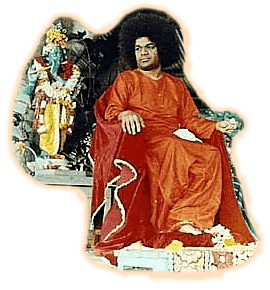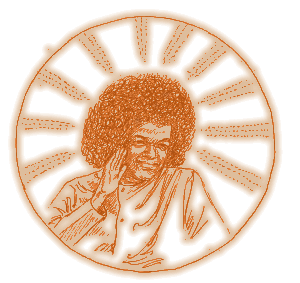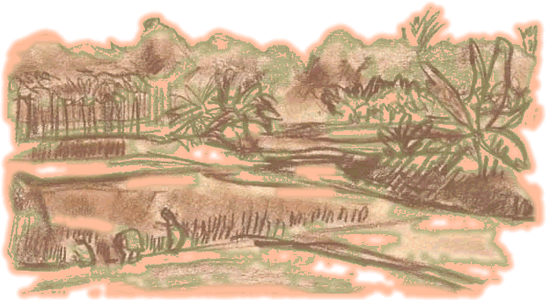|
Other Baba-books
|
||||||||
 |
The original
Sanskrit verses and with comments taken from the writings of
|
|||||||
|
'Hastasya
Bhooshanam Daanam Charity is the
ornament for the hand,
1 2a 2b 3 4 5 6 7 8 9 10 11 12 13 14 15 16 17 18a 18b
" Listen to this spoken
chapter in Audio " śrī
bhagavān uvāca jnānam te
'ham sa-vijnānam Dhyana
Yoga and Jñāna Yoga are both inner
disciplines; they are based on śraddhā (belief; finding
sympathy to engage in the sphere of devotional service; trust) and bhakti.
Without these two, they are both unattainable; the pursuit itself is
vain. A sadhaka deprived of them is as a wooden doll, lifeless,
unaware of the goal. The basic requisite is deep-rooted prema
towards the Lord. How can you get this? By getting to know the glory,
the splendor, the nature and characteristics of the Lord. His sva-bhāva
(essence, reality, truth) (bhāva: affection and
love) and sva-rūpa (form, true nature of being, essential
nature). That is why I am now instructing you about these. I am
imparting to you fully the wisdom of the śāstras, supplemented
by the wisdom of inner experience. Know that there is nothing further
for you to know. -
Gītā Vahini, pp. 92-3 In
thousands
of
aspirants,
there are few who strive to acquire this
perfection, and of those who strive and succeed, scarcely one knows Me
in reality. Of
the thousands of aspirants, there are few who strive to acquire this jñāna.
And,
of
these,
only some single individuals achieve success. All who
start do not reach the goal. - Gītā Vahini, pp. 92 manushyānām
sahasreshu bhūmir āpo
'nalo vāyuh apareyam
itas tv anyām The
five
elements,
manas (feeling, mind), buddhi
(intellect) and ahamkāra (false ego derived from being
identified with the body, self-love, selfish individuality) .... these
eight varieties of prakriti (material nature, causal matter,
creation, nature) have produced the sthula sukshma prapancha,
the gross and the subtle in creation. This is called aparā prakriti.
There is another prakriti distinct from this. That is known as parāprakriti.
It is neither sthula nor sukshma; it is chaithanya (consciousness,
intelligence),
indwelling
in
the jīvī. The jagat (universe,
cosmos, world of change, creation) itself is its aspiration. The
Lord
first
created
the gross world and then as jīva, He entered
it and rendered it chith (consciousness, knowledge, awareness)
by His chaithanya. This is declared clearly in de Vedas.
You
must
consider
this aparā prakriti to be the sva-bhāva
of Paramesvara (the Supersoul, the Absolute Master) and the parā-prakriti
to be His sva-rūpa. Dwell on the meaning of these, sva-bhāva
and sva-rūpa and grasp it well. The gross is bound by the
dictates of chaithanya, which is sarva-svathanthra,
Complete Master, ever free. Jīvī
means that which assumes prāna (the life breath, the vital
breath); the jīvī holds on to prāna, through his skill
and intelligence. He is the antar-yamin (inner ruler or being
that guides all creatures), who has penetrated into everything and who
sustains everything. So the parā-prakriti is just Paramātmā
(the Supersoul) itself. All that becomes
manifest with the same chaithanya has to be taken as one. - Gītā Vahini, pp. 92-3 etad-yonīni
bhūtāni mattah
parataram nānyat "Arjuna!
Note that there is nothing higher than Me in the world.
All are strung in Me like flowers on a string ... jada
(inanimate, lifeless, inert matter) and chaithanya
(consciousness, intelligence) are the two essentials for the entire
creation. They are the same as prakriti and purusha (perfect
person,
soul,
self,
indweller). The chaithanya śakti (śakti:
strength, energy, power, might, ability) when it entertains
the idea of bhoga (catering to the senses, eating, enjoyment),
expresses the world out of its own sva-karma (own destiny or
fate). The jada assumes the form of the deha (body).
Both these are My Nature. The īśvara, who causes creation,
preservation and dissolution through these, is I Myself, remember.
There is no substance other than Me; there is no reality other than Me.
I am the primal cause, the primal substance. 'I am One; let Me become
Many': thus, I Myself resolved upon this expansion into manifoldness,
called srishti (creation). That resolution affected and
motivated the māyā-śakti (power of illusion, the veiling and
projecting power of God) and so the mahat-tattva ('the great
principle, the principle of cosmic intelligence'; the complete of
material nature in her original undifferentiated form) got produced.
That was the first step in the evolution of prakriti." - Gītā Vahini, pp. 93 raso 'ham
apsu kaunteya "Flowers
cannot
become
a
garland without the string; so, too, Brahman
unites all jīvīs. You cannot separate the two in all
substances; Brahman fills everything. The five elements are but
its manifestations. It is the inner motive, unseen by those who look
only at the surface. It is the antar-yamin (inner ruler or
being that guides all creatures), in other words. That is why Krishna
said, "I am the pranava (a-u-m, the sacred primordial sound
principle) in the Vedas; I am sound in the ākāśa (sky,
space, ether); I am paurusham (ability, heroism, adventure and
aspiration) in man." - Gītā Vahini, pp. 96 punyo
gandhah prithivyām ca bījam mām
sarva-bhūtānām In the Gītā, the Lord
has declared, bījam
mām
sarva-bhūtānām,
I am the seed of all beings. The tree is a broad spread of
leaf and flower, fruit and green. It is a fanned out system of trunk,
branches, twigs! All have grown out of one single small seed! And,
every fruit of that tree has seeds of the same nature inside it! So
too, contemplate for a while on the magnificent multitude of life, all
its rich variety of strong and weak, prey and hunter, distressed and
delighted, creeping, crawling, flying, floating, walking, hanging,
burrowing, diving, swimming - all this uncountable variety of created
beings have come out of the beejam (Lord) (bija/beeja: seed,
germ, primary cause; mystical letter or syllable that forms the
essential part of a mantra) and each of them has in its core, the beejam,
again!
(the
Lord)!
Visualize this immanent divinity; you become humble,
wise and full of love. - Sathya Sai Speaks VII, p. 222 balam
balavatām cāham "Arjuna!
Many
people
anxious
to offer uninterrupted worship to Me go into the
thick forest. That is an insane step. There is no need to seek the
jungle as if I am only there. There is no place where I am not; there
is no form that is not Mine. I am the five elements: earth, water,
fire, air, ether! Where can you find a place devoid of one or other of
these five? To experience My Presence and My Glory, there is no special
place, for I am everything, everywhere, ever. The fiery nature of fire,
is I Myself. I am Life in all living beings, I am the strength of the
strong, the strength that is free from greed and lust. Mine is the
nature that prompts beings to desire dharmic things and means." - Gītā Vahini, p. 99 ye caiva
sāttvikā bhāvā "...
the objective world, with all its satvic, rajasic,
tamasic things, reactions, impulses ... all originate in God. This
conviction can grow in you and get firmly fixed only by reasoning it
out and getting its truth affirmed." The
Lord Himself declared: "Arjuna! All this originated from Me, all this
exists in Me, but I am not dependent on all this." - Gītā Vahini, p. 100-1 tribhir
guna-mayair bhāvair Though
gunas emanate from the Lord, He is unaffected; smoke
arises from fire, but fire is unaffected. Clouds form in the sky and
move about in the sky; but the sky is unaffected by them. All are
attached to Him, the beads; but He is free, unattached. The universe is
based on Him, but He has no need of the universe as base. - Gītā Vahini, p. 102-3 daivī hy
eshā gunamayī For
this
question
on
faulty vision, Krishna had the answer. He
said, "Listen, Arjuna! Between Me and this universe there moves māyā,
called
delusion.
It
is indeed a hard task for man to see beyond māyā,
for māyā too is Mine. It is of the same substance; you cannot
deem it separate from Me. It is My creation and under My control. It
will turn, in a trice, even the mightiest among men head over heels!
You might wonder why it is so difficult to overcome. Of course, it is
by no means easy. Only those who are whole-heartedly attached
to Me can conquer this. My māyā, Arjuna, do not take māyā
to mean some ugly thing that has descended from somewhere else; it is
an attribute of the mind; it makes you ignore the true and the eternal paramātmā
and value instead the attributeful created manifold multiplicity of
name and form. It causes the error of believing the body as the self,
instead of the embodied (the deha instead of the dehi).
Māyā is not something that was and will disappear;
nor is it something that was not, but later came in and is. It never
was, or is, or will be." - Gītā Vahini, p. 104-5 na mām
dushkritino mūdhāh "All
men
do
not
get the inner prompting to conquer māyā, by
surrendering their all to the Lord. It depends on merit or demerit,
accumulated during many births. Those who have only demerit as their
earnings will pursue the fleeting pleasures of the senses. Like the
birds and the beasts, they revel in food and frolic; they take these as
the purpose of life; they do not entertain any thoughts of God; they
dislike the company of the virtuous and the good; they stray away from
good acts; they become outlaws from the realm of God." - Gītā Vahini, p. 106-7 catur-vidhā
bhajante mām "God
is
worshipped
by
four kinds of devotees; ārto (the distressed),
arthārthī (the ones who desire material gain), jijñāsu
(the
inquisitive ones) and jñānī (the ones who know things as they
are), God loves all of them. He grants them boons appropriate
to their thoughts and attributes. - Summer Showers in Brindavan 1979, p. 66 "Listen.
Those who seek Me are of four types. One is always worn out by ills
that affect the body; he is the ārta. Another is worried by the
struggle for prosperity, power, self, property, posterity, etc. He is
the arthārthī. A third yearns for the realization of the ātmā,
reads
the
scriptures
and sacred texts, moves ever in the company of
spiritual sadhakas, acts along the lines laid down by the sages
of sadachara (good conduct), and is always motivated by the
eagerness to reach the sannidhi (presence) of the Lord. He is
the jijñāsu. The fourth is the jñānī.
He
is
immersed
in the Brahmathathwam (formless God, brahman
principle). - Gītā Vahini, p. 62-3 teshām
jñānī nitya-yukta "The
jñānī will not raise his eyes towards anything other
than the Lord. Even if he does, he sees the Lord wherever his eyes are
cast. That is the reason why the Lord has declared that the jñānī is
the
dearest
to
Him. - Gītā
Vahini, p. 108 udārāh
sarva evaite "A
jñānī is the only individual who has reached the
summit of spirituality. He has attained the acme of wisdom. He alone
can reach and know God. It does not mean that the others cannot know
God. They, too, can realize God if they dedicate all their actions to
God in a spirit of self-abnegation. Killing of the lower self is more
important than memorizing all the scriptures. "This
is
the
easiest
path to God-realization. Every act should be treated as
a sacrament. Meditation, yoga, and rites and rituals are no
longer essential to the jñānī. His life and his actions are
dedicated to God in complete self-surrender. He remains unattached to
the fruits of his actions. - Summer Showerws in Brindavan 1979, p. 67.Gītā bahūnām
janmanām ante "The
bhakta must be convinced that all this is Vāsudeva,
"vāsudeva sarvam-idam". That is to say, one's own ātmā
is everywhere in everything; this truth must be realized, acted upon
and experienced. Hating another is hating oneself; scorning another is
but scorning oneself; finding fault with another fault with oneself. - Gītā Vahini, p. 187-8 "vāsudevah
sarvam
iti
(All this is God, Vāsudeva). The divine
principle that is in every one is like the electric current that
illuminates the bulbs, before Me here, of different colors and
different candle powers. The same God shines in and through every one,
whatever be the creed, color, tribe or territory. The current animates
and activates all bulbs; the divine animates and activates all. Those
who see difference are deluded; they are befogged by prejudice, egoism,
hatred or malice. Love sees all as one divine family. - Sathya Sai Speaks V, pp.
224-5 kāmais tais
tair hrita-jñānāh yo yo yām
yām tanum bhaktah sa tayā
śraddhayā yuktas ntavat tu
phalam teshām "Only
those
prayers
that
have their origins in the spirit of nishkama
karma, infinite and pure love, and an unsullied heart reach the
Lord directly. It is not possible for prayers of any other kind to
reach Him directly. Therefore, it is only through these three media,
that is, nish-kama-karma (renunciation of the fruit of
action), boundless love and an unsullied heart, that we can hope to
secure direct contact with the Lord and obtain His divine sanction to
our request. - Summer
Showers
in
Brindavan
1979, p. 8 avyaktam
vyaktim āpannam nāham
prakāśah sarvasya "Just
as there is divine nature behind the phenomenal nature,
there is also the divine mind behind the phenomenal mind. True
spirituality lies in the recognition and apprehension of the Divinity
underlying the phenomenal world of mind and matter. - Summer Showers in Brindavan
1979, p. 122 vedāham
samatītāni icchā-dvesha
samutthena yeshām tv
anta-gatam pāpam "This
is
the
meaning
of what is called ātmā-samyama, the control of
the senses, detachment from the outer sensory world, the withdrawal of
the mind from the outer world. This is the goal of all life; knowing
the paramātmā, attaining liberation. There can be no second aim
for man. Man is endowed with life, not as a means for building
bungalows, the acquisition of estates, the accumulation of wealth, the
addition of progeny, the earning of titles or ascent into higher rangs
of social life. His greatness does not depend on these. The chiefest
success in life lies in the winning of permanent bliss, permanent
escape from grief and agitation. - Gītā Vahini, p. 115 jarā-marana-mokshāya "Arjuna!
Everyone
is
anxious
to avoid old age and death; it is human nature so
to be anxious. But of what avail is mere anxiety? One's conduct and
behavior should be in accordance with one's objective. If one has
sincere yearning and if one places full trust and faithfully surrenders
to the Lord, the fog of grief will be dispensed by the rays of His
grace. If on the other hand one places his trust on the objects of this
world, the consequent grief will never end; nor can they be ended by
any other than the Lord. Serve the Master of māyā, the designer
of all this dreamland, rather than the dream itself. How can attachment
to delusion yield anything but disappointment. How can joy be won by
such pursuits? If joy is not won and grief avoided, how can liberation
be achieved!" Krishna asked. - Gītā Vahini, p. 116 sādhibhūtādhidaivam
mām "I
am master of adhibhūta, adhidaiva and ādhiyajña,
and
if
I
am thus worshipped, the worshipper will evelop equanimity and
full control of the vagaries of the mind. Besides, such a person will
dwell on Me, without forgetting Me even in his last moments. For that
reason, he will reach Me too. That is to say, he will merge in Me." - Gītā Vahini, p. 115-6
|
||||||||





